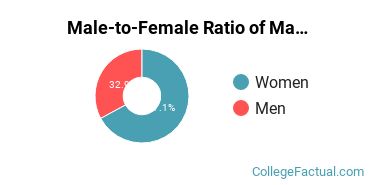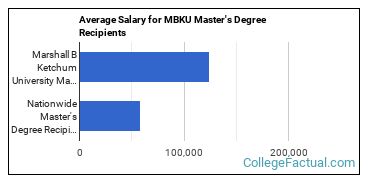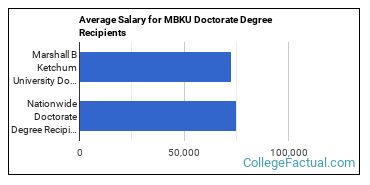 by our College Data Analytics Team
by our College Data Analytics TeamThe total graduate student population at MBKU is made up of 67.1% women and 32.9% men. Note that these percentages may differ for certain degree programs.

About 65.0% of the graduate students who attend MBKU are from a racial-ethnic minority group*. The school attracts students from outside the U.S., too. Around 1.9% of graduate students hail from another country. The chart below shows the breakdown of graduate student demographics at the school. You can click on it for a more detailed view.

The average graduate full-time tuition and fees is shown in the table below.
| In-State | Out-of-State | |
|---|---|---|
| Tuition | $38,255 | $38,255 |
| Fees | $153 | $153 |
After obtaining their master's degree from MBKU, graduates go on to jobs earning an average starting salary of $124,661. That's good news for those graduates since it is 113% higher than the national average of $58,425.

After obtaining their doctorate degree from MBKU, graduates go on to jobs earning an average starting salary of $72,885. That's about 3% lower than the countrywide average of $75,260 for all doctorate degree holders.

Get more details about the location of Marshall B Ketchum University.

Contact details for MBKU are given below.
| Contact Details | |
|---|---|
| Address: | 2575 Yorba Linda Blvd, Fullerton, CA 92831-1699 |
| Phone: | 714-449-7451 |
| Website: | www.ketchum.edu/ |
During the 2020-2021 academic year, 1.8% of the graduate students at MBKU took at least one online course. For that same period, 1.8% of grad students took all of their classes online.

The only degree programs listed here are those in which master’s degrees were awarded in 2020-2021.
| Master’s Degree Program | Annual Graduates |
|---|---|
| Allied Health Professions | 40 |
Just like the master’s degree programs, only programs that had doctorate degrees awarded in 2020-2021 are shown here.
| Doctorate Degree Program | Annual Graduates |
|---|---|
| Optometry | 98 |
| Pharmacy/Pharmaceutical Sciences | 47 |
Footnotes
*The racial-ethnic minorities count is calculated by taking the total number of students and subtracting white students, international students, and students whose race/ethnicity was unknown. This number is then divided by the total number of students at the school to obtain the racial-ethnic minorities percentage.
References
More about our data sources and methodologies.